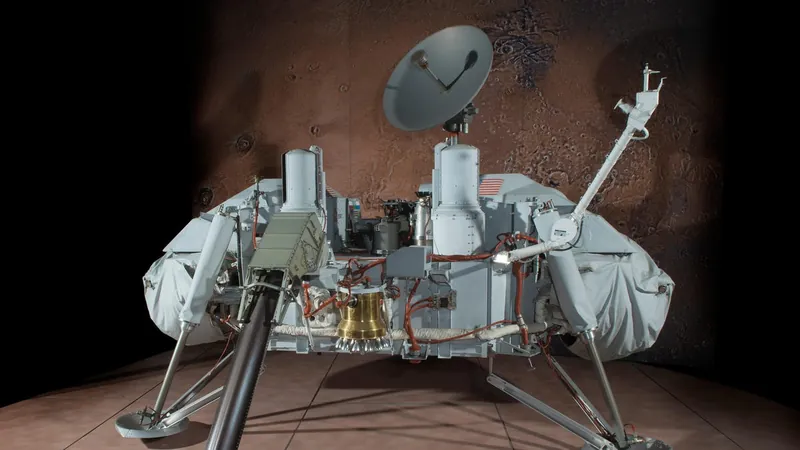
Did NASA Accidentally Snuff Out Martian Life? Shocking New Revelations!
2024-11-25
Author: Jia
NASA and Martian Life
Could NASA have unwittingly extinguished the last remnants of life on Mars? According to recent commentary from Dirk Schulze-Makuch, an astrobiologist at the Technische Universität Berlin, evidence suggests that the Viking 1 lander, which touched down on Mars in 1976, might have done just that.
The Viking 1 Lander's Impact
In an intriguing study published in the prestigious journal Nature, Schulze-Makuch argues that NASA's preconceived notions regarding extraterrestrial life may have led them to mishandle the delicate Martian environment. Specifically, he believes that the Viking 1's experiments—centered around analyzing Martian soil samples—could have inadvertently killed off any existing microbial life by introducing excessive amounts of water.
Lessons from Extreme Environments
Drawing parallels with extreme environments on Earth, Schulze-Makuch explains, “My extensive research in the Atacama Desert—an environment similar to Mars—has shown how organisms can survive in parched conditions.” This insight led him to conclude that Martian life forms, if they ever existed, may have been uniquely adapted to their surroundings in ways that we don’t yet understand.
Scientific Reception
This is a stunning revelation that raises alarm bells across the scientific community. In his discussions during a European Space Agency meeting, he noted that those present received his theory with surprising openness rather than the skepticism he anticipated. This suggests a growing acknowledgment among scientists of the complexity and resilience of life in harsh conditions.
The Role of Salts
The crux of Schulze-Makuch's argument focuses on the role of salts present in Martian soil. These salts, he points out, can absorb water directly from the atmosphere, creating micro-environments where life could thrive even in the absence of liquid water. He elaborates on how a hysteresis effect allows these salts to retain water longer than expected, thereby making it accessible to microbes, if they indeed exist.
Mars' Past
Though he acknowledges that we can’t definitively claim there are organisms on Mars utilizing these mechanisms, he suggests that 4 billion years ago, Mars was remarkably similar to Earth, with ample water. As the planet transitioned to its current desolate state, any surviving life forms would have needed to develop extraordinary adaptations to endure the changing climate.
Hypothetical Martian Microbes
“But don’t mistake these hypothetical microbes for typical science fiction fare,” Schulze-Makuch cautions. “They wouldn’t necessarily be repelled by water like the aliens depicted in movies. Instead, they would likely be sensitive to how liquid interacts with their surroundings.”
Future of Mars Exploration
As we stand on the brink of a new era in space exploration, these revelations challenge our understanding of life beyond Earth and pose critical questions about our explorations of other planets. Have we been too quick to impose Earth-like standards on alien worlds? The stakes are high as we continue to seek answers, and the implications for future Mars missions could be profound. Will we take this knowledge into account, or risk repeating the mistakes of the past? Stay tuned for more updates as we dive deeper into the Martian mystery!


 Brasil (PT)
Brasil (PT)
 Canada (EN)
Canada (EN)
 Chile (ES)
Chile (ES)
 España (ES)
España (ES)
 France (FR)
France (FR)
 Hong Kong (EN)
Hong Kong (EN)
 Italia (IT)
Italia (IT)
 日本 (JA)
日本 (JA)
 Magyarország (HU)
Magyarország (HU)
 Norge (NO)
Norge (NO)
 Polska (PL)
Polska (PL)
 Schweiz (DE)
Schweiz (DE)
 Singapore (EN)
Singapore (EN)
 Sverige (SV)
Sverige (SV)
 Suomi (FI)
Suomi (FI)
 Türkiye (TR)
Türkiye (TR)